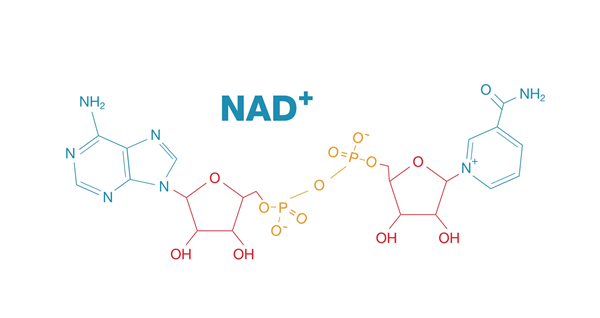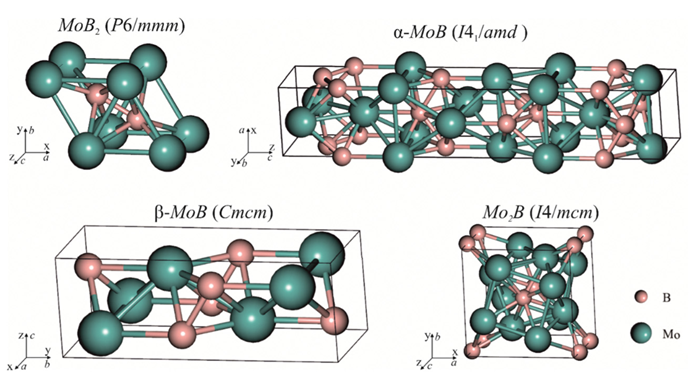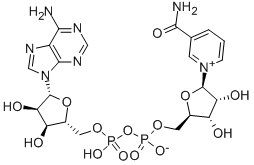Side effects of NAD+ oral or injectable therapy
Apr 17,2024
What is NAD+?
Nicotinamide adenine dinucleotide (NAD) is a cofactor in redox reactions and central to energy metabolism.NAD can directly or indirectly affect many key cellular functions, including metabolic pathways, DNA repair, chromatin remodelling, cellular senescence, and immune cell function. NAD+ is present in every cell in the body, and is essential for the production of cellular energy and the maintenance of cellular health. Its levels decline with age and are strongly associated with aging.

NAD acts on mitochondria and increases the length of telomeres, the protective caps located at the ends of chromosomes that become shorter as the body ages. NAD increases the activity of the SIRT1 and PARP 1 proteins, which are associated with a slower rate of aging and influence DNA repair, respectively. NAD+ has been shown to be an atypical RNA cap that occurs in a variety of organisms and may regulate RNA stability, transcription, and translation. This may help the body better prevent or treat diseases associated with aging.
Side effects
NAD produces energy in the body, regulates important cellular processes, and acts as an antioxidant to protect the body from free radicals, just to name a few. However, when NAD levels decline, as NAD cannot be taken directly from food, restoring NAD levels with the NAD precursors nicotinamide riboside (NR) and nicotinamide mononucleotide (NMN) has become an important therapeutic approach in the treatment of age-related diseases and appears to have beneficial effects in the body, so many people will opt to take NAD+ orally or by injection to replenish their NAD levels to ensure that the body is is in optimal condition.
Oral NAD+ supplements are mostly well tolerated at normal doses with no serious side effects. However, side effects that may occur include: nausea, fatigue, brain fog, headache, diarrhoea, indigestion, stomach upset and cramps during treatment. Bruising at the injection site, fatigue, muscle cramps and dry mouth may occur with injection use and usually disappear within a few days. Rare side effects may occur as injection site infections, inflammation of the veins and allergic reactions. If a serious side effect occurs, contact your doctor immediately.
References:
[1] WANG X, YU D, YU J, et al. Toll/interleukin-1 receptor (TIR) domain-containing proteins have NAD-RNA decapping activity[J]. Nature Communications, 2024. DOI:10.1038/s41467-024-46499-y.
[2] ISHIMA T, KIMURA N, KOBAYASHI M, et al. A Simple, Fast, Sensitive LC-MS/MS Method to Quantify NAD(H) in Biological Samples: Plasma NAD(H) Measurement to Monitor Brain Pathophysiology[J]. International Journal of Molecular Sciences, 2024. DOI:10.3390/ijms25042325.
- Related articles
- Related Qustion
- Oxidation and reduction of β-Nicotinamide adenine dinucleotide (NAD+) Jun 7, 2024
β-Nicotinamide adenine dinucleotide (NAD+) is an electron carrier as it carries electrons from hydride from one region of the cell to another.
- NAD+:Introduction;Biosynthesis;Metabolism in aging and disease Nov 16, 2023
NAD+ metabolism has been linked to a variety of age-related diseases, mainly tumours, metabolic diseases, neurodegenerative diseases, and aging.
- β-Nicotinamide adenine dinucleotide: Biosynthesis, physiological function and application Apr 17, 2023
β-Nicotinamide adenine dinucleotide is a cofactor and plays a major role in metabolism, involved in redox reactions, carrying electrons from one reaction to another.
Supplementation with pyridoxal 5'-phosphate monohydrate can synthesize neurotransmitters such as dopamine and serotonin, maintaining a healthy nervous system.....
Nov 4,2025Biochemical EngineeringMolybdenum-based materials and molecules have drawn much attention recently. This article will introduce the crystal structure and catalytic activity of molybdenum borides.....
Apr 17,2024Inorganic chemistryYou may like
- Diosgenin:Uses,Functions and Synthesis
Dec 12, 2025
- Biosynthesis of Cyclopamine from Cholesterol
Dec 10, 2025
- Synthesis of ribociclib
Dec 10, 2025
β-Nicotinamide adenine dinucleotide manufacturers
- Nicotinamide Adenine Dinucleotide(NAD?)
-

- $1.00 / 5KG
- 2025-12-12
- CAS:53-84-9
- Min. Order: 25KG
- Purity: 99%
- Supply Ability: 20T
- NAD+ 500MG/1000MG
-

- $110.00/ kit
- 2025-12-12
- CAS:53-84-9
- Min. Order: 1kit
- Purity: 99%
- Supply Ability: 10000kits
- beta-Diphosphopyridine nucleotide
-

- 2025-12-12
- CAS:53-84-9
- Min. Order:
- Purity: 0.99
- Supply Ability:






